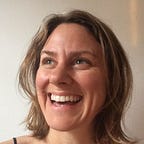Sasha Chanoff, on the Future of Refugee Response
Hi, I’m Sasha, creator of: RefugePoint — we champion solutions for refugees around the world so that they can rebuild their lives.
Home base: Somerville, MA, outside Boston, where I live with my wife and two kids. I was born in Finland where my mom is from, spent time in France and Germany, and lived in Kenya for many years.
Ten years ago: We were focused on how to reach the most at-risk refugees, those who had fallen through the cracks of humanitarian aid and were in life threatening peril — how to help get them to safety and rebuild their lives.
Today, I say: We need to build new humanitarian systems to reach those most at risk. It’s a moral imperative to help refugees. We should also understand that refugees represent massive untapped potential in terms of skills, abilities, entrepreneurship, and drive to succeed. Some countries are beginning to act on this. For example, the government of Canada wants to welcome one million immigrants in the next three years — they need more workers in some areas. They have asked us to identify refugees as part of this labor mobility commitment.
Surprising facts: 1) Over 70 million people have been forced to flee their homes — more than at any other time. A third of them have fled across an international border and are considered refugees. 2) People are living as refugees for longer periods, now 20 to 25 years on average. 3) Since WWII, the frame for supporting refugees has been emergency aid — give tents, food, and aid — until they can go home. That works in a crisis, but no longer fits the reality most refugee communities face. We need to change things up. We need to figure out how to help refugees support themselves, and simultaneously figure out how to better support their host communities.
A moment of commitment: 20 years ago, I faced a life or death decision in the Congo during an effort to evacuate people who were escaping massacres. The decision was about whether to take additional people on our flight out, even though doing so jeopardized everyone on our evacuation list and went against orders. My colleague and I decided to go against orders and try to take the additional people we met — a group of widows and orphans. The experience opened my eyes to people who are overlooked and forgotten and was a catalyst for starting RefugePoint. I wrote about it in the book I co-authored with my dad, From Crisis to Calling: Finding Your Moral Center in the Toughest Decisions.
A weekly practice: RefugePoint is fundamentally a collaborative organization, a field-builder. Recently we changed our mission statement to reflect this. Practically, this means I regularly set aside time to support emerging changemakers and partner organizations who have ideas the world and our field need. I try to connect them with peers and resources. Today, for example, I have a few calls with people seeking advice, connections, resources. I feel like making time for this is essential and ultimately helps move solutions forward in better ways. If we are truly acting for those we serve first and foremost, then we should also be supporting other organizations that are dedicated to the same population.
On my bookshelf: I just read The Overstory, a book about trees and the interconnectedness of nature. It’s incredible. I also recommend Let’s Go Swimming on Doomsday by Natalie Anderson for young adult readers. It’s about a Somali refugee boy confronting his past and finding meaning in his life. Natalie worked with us at RefugePoint and I love the creative way she found to express what she learned from the thousands of interviews she’s done.
A changemaker who inspires me: Jessica Houssian, our former board chair at RefugePoint. She just co-founded the Equality Fund, the largest fund for women’s rights in the world, seeded with $300 million from the Canadian government. Watching Jessica’s journey in philanthropy since I’ve known her has been inspiring.
Last changed my mind: I just got back from Pictou County in Nova Scotia, where some refugees will arrive soon as part of the Canada labor mobility project we’re piloting. I saw the warmth and welcoming spirit of this rural community as it prepares to receive these families and workers. Less a change of mind than an opening of mind, it was a reminder to me of the extraordinary power of welcoming.
Advice to young people: You are unique. The way to understand things is to have experiences. Doing so will sharpen your sense of what you want to do, and what’s right and wrong. What is it that you were born to do? Try to figure that out. Keep working at it. Take everything you know, everything you understand, and listen to your own instincts when you face tough or complicated situations. If you can find your own path, you’ll feel fulfilled.
Meet the refugees in Sasha’s network here.
Sasha joined Ashoka as an Ashoka Fellow in 2012. You can follow him on Twitter at @SashaChanoff and RefugePoint at @RefugePt
This interview was condensed by Ashoka, the world’s largest community of leading changemakers with 3,800 Ashoka Fellows worldwide. You can follow Ashoka’s U.S. team on Twitter at @AshokaUS and Instagram at @ashoka_usa and/or subscribe for weekly insights straight to your inbox.
